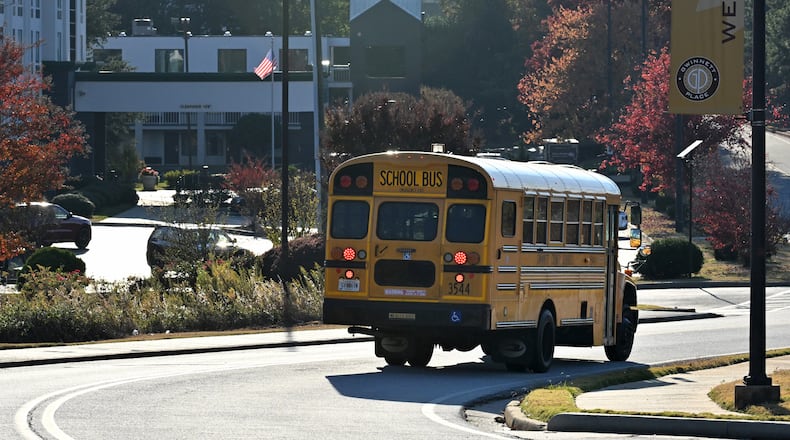According to the Georgia Department of Education, 66.8 percent — more than 1.2 million — of Georgia’s students miss at least six days of school each year. The chronic absenteeism rate has reached 24.8 percent, which means that more than 450,000 Georgia students are missing at least 18 days of school each year.
Research shows that school absences take a toll on grades and performance on standardized tests. An analysis of national absenteeism data from 2019 and 2022 by the Council of Economic Advisers and the national Center for Education Statistics found that the observed association between absenteeism and standardized test scores is large enough to account for 16 to 27 percent of the overall test score declines in math, and 36 to 45 percent of the declines in reading.
Beyond test scores, irregular attendance can be a predictor of high school drop-out, which has been linked to poor labor market prospects, diminished health and increased involvement in the criminal justice system.
Consider the difference in chronic absenteeism rates in metro Atlanta school districts from 2019 to 2023.
Cherokee 9 percent to 14 percent;
Clayton, 19 percent to 29 percent;
Cobb, 10 percent to 20 percent;
DeKalb, 17 percent to 30 percent;
Doulgas, 13 percent to 26 percent;
Fayette, 9 percent to 14 percent;
Forsyth, 6 percent to 18 percent;
Gwinnett, 9 percent to 19 percent;
Henry, 14 percent to 27 percent;
Rockdale, 14 percent to 27 percent.
School absenteeism and mental health share a complex relationship. One often influences the other. Over the past decade, increasing rates of student absenteeism in Georgia has gone hand in hand with increasing rates of mental health challenges among Georgia’s students, as shown by the results of the Georgia Student Health Surveys.
Students experiencing anxiety, depression or other mental health disorders might find it difficult to attend school regularly because of overwhelming emotions or fear of social interactions. Conversely, missing out on education and social interactions in school can exacerbate existing mental health problems or contribute to feelings of isolation and inadequacy.
Further, the stigma surrounding mental illness can contribute to feelings of shame or embarrassment, leading students to avoid school to avoid potential judgment or negative interactions. Therefore, addressing mental health concerns is crucial in mitigating school absenteeism and supporting students in their academic success.
The challenges facing Georgia’s students are not the sole responsibility of Georgia’s school systems. The work to address these challenges requires a vigorous response from the broader community. For example, Georgia Code 20-2-690.2, amended in 2018, requires the chief judge of the superior court of each county to establish a student attendance and school climate (SASC) committee for such county.
The SASC is comprised of community members from child protection, education, judicial, juvenile justice, law enforcement, mental health and public health agencies. The purposes of the committee include ensuring coordination and cooperation among officials, agencies and programs involved in compulsory attendance issues, reducing the number of unexcused absences from school, and improving the school climate in each school.
Credit: handout
Credit: handout
The problem: Fewer than 10 percent of Georgia’s more than 150 counties have SASCs.
Last year, a survey was sent to all superior court judges in Georgia asking how many courts were implementing the SASC law. Few judges bothered to reply to the survey. Among those who did reply, many indicated they were unfamiliar with the law.
As our judges would be the first to say, ignorance of the law is no excuse. Further, the Georgia Code of Judicial Conduct requires judges to perform the duties of judicial office competently and diligently. The duties of judicial office include the establishment and operation of SASCs.
It would be one thing if all counties had active SASCs that were wrestling with chronic absenteeism and had not yet found solutions. What we have instead is a seemingly willful refusal by community leaders throughout Georgia to even get in the game.
Some might say a SASC would be just one more meeting to attend, but since when is inconvenience an acceptable excuse for not trying to identify and solve solvable problems that impact Georgia’s children?
Many of the designated representatives on SASCS, including judges, district attorneys, police, sheriffs and juvenile justice representatives, hold positions that are designed to ensure accountability by Georgia citizens for complying with state laws. Why is there no accountability for their failure to comply with Georgia Code § 20-2-690.2? Georgia’s children, parents and teachers are awaiting an answer.
Roland Behm is a co-founder of the Georgia Mental Health Policy Partnership, a former chair of the Georgia chapter of the American Foundation for Suicide Prevention and a 1987 graduate of the University of Georgia School of Law.
About the Author
Keep Reading
The Latest
Featured


